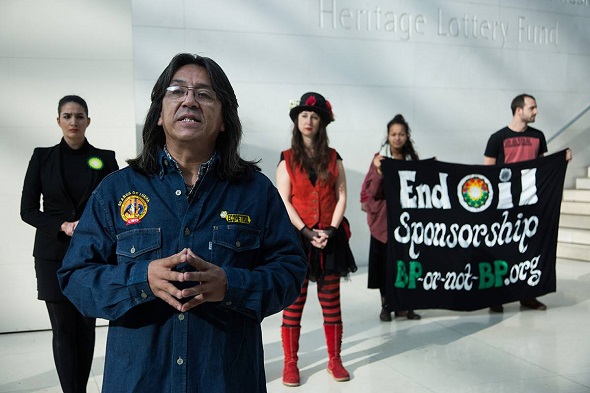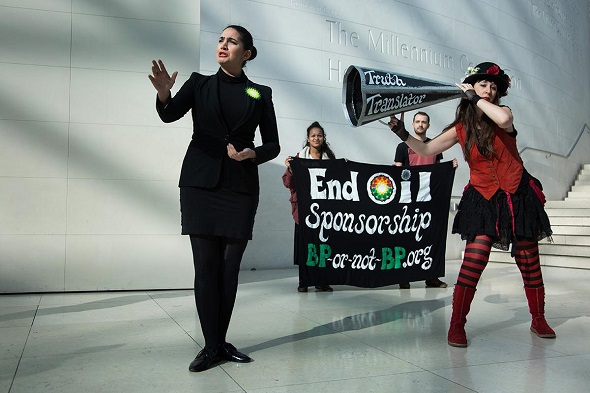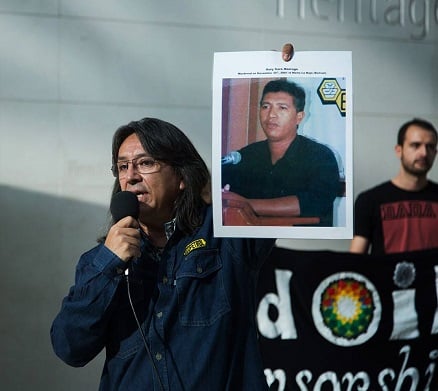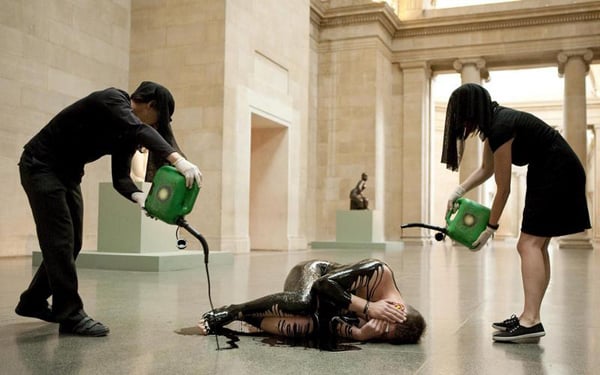Law & Politics
Colombian Kidnapping Victim Calls for Justice at BP-Sponsored British Museum
He was kidnapped after organizing a strike following a colleague's murder.

He was kidnapped after organizing a strike following a colleague's murder.

Henri Neuendorf

A Colombian oil trade unionist who claims to have been kidnapped and tortured by a paramilitary brigade contracted by the BP affiliate Ocensa called for the British Museum to sever its sponsorship ties with the British oil company in a dramatic protest held at the institution this past Sunday.
Following an attention-grabbing performance, Gilberto Torres addressed museum visitors who had gathered around him, telling them of his ordeal, the New Internationalist reported.
“When I was kidnapped I knew what was going to happen to me. I knew I was going to be murdered and left by the side of some road,” he said.

Protestors performed a “lie translator” piece to grab museum-goers attention.
Photo: Kristian Buus via The New Internationalist
“But thanks to people’s solidarity, both national and international, to an oil workers’ 24-day strike, and to demonstrations by communities in Colombia and human rights organizations, I was not executed. Instead, I was held for 42 days, then finally released.”
The engineer believes he was “disappeared” for orchestrating a strike in response to the killing of a friend, colleague and fellow trade unionist who was kidnapped under similar circumstances.
Torres is now pursuing damages in a British court. According to the Guardian, BP held a 15.2% stake in Ocensa at the time of the kidnapping.

Torres holds up a photo of his murdered friend, colleague and fellow trade unionist.
Photo: Kristian Buus via The New Internationalist
The engineer and his human rights lawyers from London firm Deighton Pierce Glynn argue that the firm failed to prevent Colombian paramilitaries from kidnapping, torturing, and killing oil workers.
“I believe that British justice will rule in my favor,” Torres told visitors. “Not only in favor of myself, but also in favor of justice, in favor of this not happening again.”

Protestors from the “Liberate Tate” group staging an occupation at the Tate Modern in June.
Photo: Martin LeSanto-Smith via The Guardian
He concluded “as a person who has been kidnapped, who has suffered and has been on the edge of death, I am here to tell the public in London, and those who make the laws: please legislate. Pass a law that prosecutes the human rights violations committed by corporations from this country, in this case BP.”
The chilling protest highlighting the corporation’s human rights abuses comes after a series of similar protests against BP’s sponsorship of the arts staged by environmentalists at a number of London institutions including the National Portrait Gallery, the Tate, and the Tate Modern.

Liberate Tate stages a protest at Tate Britain (2011)
Photo: Amy Scaife Courtesy Corbis
Campaigners argue that the corporation uses its arts sponsorship program to launder its public image to detract media attention from mounting negative and damaging allegations.